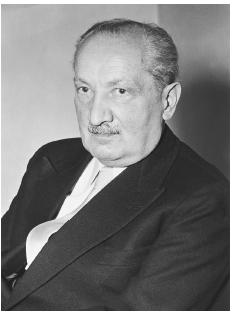Heidegger, Martin
One cannot fully live unless one confronts one's own mortality. This hallmark of existentialist thought owes much to the works of Martin Heidegger. Heidegger (1889–1976) was born in Germany's Black Forest region. He held an early interest in theology and the priesthood, but soon shifted his attention to philosophy. At the University of Freiburg he studied under Edmund Husserl, and eventually succeeded him as chair of philosophy. Heidegger went on to become a leading exponent of phenomenological and existential philosophy, which he blends together in his Being and Time (1927).
In this monumental work Heidegger addresses issues related to death, exploring the human being in his or her temporality. This connection is important. For Heidegger, the human being cannot achieve a complete or meaningful life, or any kind of "authentic existence," unless he or she comes to terms with temporality—a uniquely human awareness that a human being is a finite, historical, and temporal being. The awareness of death is a central beginning for understanding this temporality.
According to Heidegger, the human being must understand that he or she is a "being toward death" ( Being and Time ). "As soon as man comes to life," he says, "he is at once old enough to die" (Heidegger 1962, p. 289). Therefore the awareness and acceptance of death is a requirement for authentic existence. Heidegger refers to the inauthentic self as the "they-self." This is the self that is influenced by the crowd or the "they," rather than by its own unique potentialities. The they-self sees death as a subject producing "cowardly fear, a sign of insecurity" (p. 298) and therefore a fit topic to be avoided. Avoidance of death can be achieved by an evasion technique Heidegger refers to as the "constant tranquilization about death." In so doing, the they-self "does not permit us the courage for

Death, the they-self argues, is something all human beings will experience one day in the undetermined and, therefore, easily ignored future. People experience death in the death of others, and draw conclusions about their own deaths. As Heidegger states, this is as if to say, "One of these days one will die too, in the end; but right now it has nothing to do with us" (p. 297). But for Heidegger death is not a shared experience at all; rather, it is one's "ownmost" and a "non-relational" experience. That is, death is something one can only do by oneself, as each person dies his or her own death.
What is the proper attitude toward one's death? Heidegger rejects the cowardly fear proposed by the they-self. The only proper mood, he argues, when one comes "face-to-face" with the "nothing" that death reveals, is a courageous "anxiety" (p. 310). This anxiety or dread, as the scholar Michael Gelven points out, is different from fear in that fear attaches to some actual object, while anxiety focuses on freedom and possibility. Only such a mood, says Heidegger, will bring about an "impassioned freedom towards death " (p. 311). Heidegger's reflections on death, therefore, are not obsessions with morbidity. Nor does he offer a religious hope of life after death. Rather, healthy anxiety about death provides courageous awareness and acceptance of death, and of one's finitude.
See also: Anxiety and Fear ; Kierkegaard, SØren ; Philosophy, Western
Bibliography
Gelven, Michael. A Commentary on Heidegger's Being and Time. New York: Harper and Row, 1970.
Heidegger, Martin. Being and Time. 1927. Reprint, New York: Harper and Row, 1962.
Krell, David Farrell. Intimations of Mortality: Time, Truth and Finitude in Heidegger's Thinking of Being. University Park: Pennsylvania State University Press, 1986.
WILLIAM COONEY
Comment about this article, ask questions, or add new information about this topic: